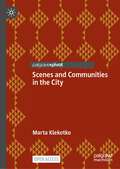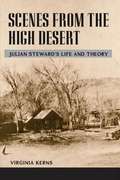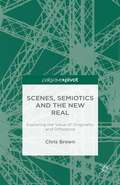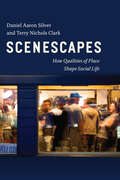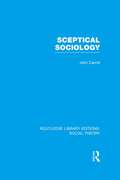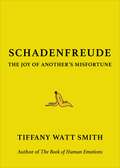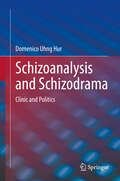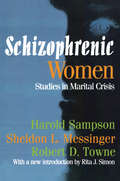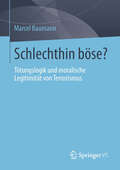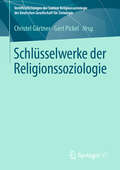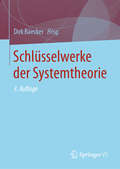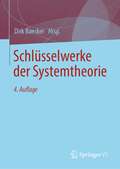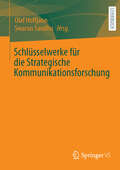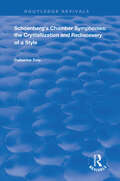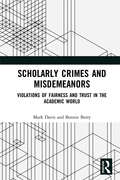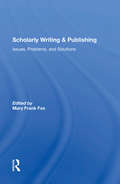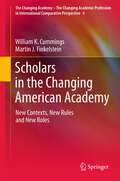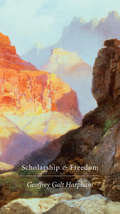- Table View
- List View
Scenes and Communities in the City
by Marta KlekotkoThis open access book addresses the problem of creation and reproduction processes of contemporary urban communities, as well as cultural mechanisms and factors of these processes. Rejecting both the environmental determinism, and cultural reductionism of community studies, the book assumes that the postmodern city is a space of diverse urban communities that go far beyond the traditional concept of neighbourhood as well as personal and imagined communities, and thus proposes to comprehend urban community as social practice embedded in urban space. The book applies the Theory of Social Practice and the Theory of Scenes and develops the concept of socio-cultural opportunity structures in order to explain how cultural practices of individuals and symbolic dimensions of territory interact, leading to (re)production of various forms of urban community. It is assumed that culture in general and symbolic meanings of territory in particular, play a crucial role in the process of (re)production of urban communities, that this process takes place in collective cultural consciousness and is mediated by territorially embedded cultural practices of individuals. The book overcomes theoretical gaps in classical community studies and develops a new perspective on urban communal processes based on the analysis of social practices in urban cultural scenes.
Scenes from the High Desert: Julian Steward's Life and Theory
by Virginia KernsJulian Steward (1902-72) is best remembered in American anthropology as the creator of cultural ecology, a theoretical approach that has influenced generations of archaeologists and cultural anthropologists. Virginia Kerns considers the intellectual and emotional influences of Steward's remarkable career, exploring his early life in the American West, his continued attachments to western landscapes and inhabitants, his research with Native Americans, and the writing of his classic work, Theory of Culture Change. With fluid prose and rich detail, the book captures the essence and breadth of Steward's career while carefully measuring the ways he reinforced the male-centered structure of mid-twentieth-century American anthropology.
Scenes, Semiotics and The New Real: Exploring the Value of Originality and Difference
by Chris BrownThis book provides a semiotic analysis of 'scenes', powerful vehicles for introducing new ideas, perspectives and behaviours, as a concept. In particular, it examines the types of scene that exist; explores their effectiveness in spreading new ideas; and considers their vital role in introducing originality and difference in modern society.
Scenescapes: How Qualities of Place Shape Social Life
by Daniel Aaron Silver Terry Nichols ClarkLet's set the scene: there's a regular on his barstool, beer in hand. He's watching a young couple execute a complicated series of moves on the dance floor, while at the table in the corner the DJ adjusts his headphones and slips a new beat into the mix. These are all experiences created by a given scene--one where we feel connected to other people, in places like a bar or a community center, a neighborhood parish or even a train station. Scenes enable experiences, but they also cultivate skills, create ambiances, and nourish communities. In Scenescapes, Daniel Aaron Silver and Terry Nichols Clark examine the patterns and consequences of the amenities that define our streets and strips. They articulate the core dimensions of the theatricality, authenticity, and legitimacy of local scenes--cafes, churches, restaurants, parks, galleries, bowling alleys, and more. Scenescapes not only reimagines cities in cultural terms, it details how scenes shape economic development, residential patterns, and political attitudes and actions. In vivid detail and with wide-angle analyses--encompassing an analysis of 40,000 ZIP codes--Silver and Clark give readers tools for thinking about place; tools that can teach us where to live, work, or relax, and how to organize our communities.
Sceptical Sociology (Routledge Library Editions: Social Theory)
by John CarrollJohn Carroll contends that since 1918 sociology has distinguished itself by making society appear as dull as it is at its worst. Using barbaric jargon, legalistic syntax and vacuous statistical tables, and driven by an obsession with the humdrum, it has exhibited some of the worst traits of the culture it should have been laying bare. Sceptical Sociology examines where sociology went wrong, and what ought to be done to transform it into a worthwhile enterprise. In a series of studies of contemporary Western society, the author puts into practice the principles of a ‘sceptical sociology’. There are enquiries into the cleanliness compulsion among housewives, the conflicting dream and reality of the tourist, the moral centrality of the car, the tactics of the latest shopping palaces. There is an allegory on fur hats, a dark portrait of a typical modern marriage, a putting of intellectuals in their place, and a pursuit of the sociology of space through the universal longing for home. The author contends that sociology ought to be the important stories about a society and its times, well told. Sceptical Sociology attempts to show that it can be well done.
Schadenfreude: The Joy of Another's Misfortune (Wellcome Ser.)
by Tiffany Watt SmithAn entertaining and insightful exploration of schadenfreude: the deliciously dark and complex joy we've all felt, from time to time, at news of others' misfortunes. You might feel schadenfreude when...the boss calls himself "Head of Pubic Services" on an important letter.a cool guy swings back on his chair, and it tips over.a Celebrity Vegan is caught in the cheese aisle. an aggressive driver cuts you off - and then gets pulled over.your co-worker heats up fish in the microwave, then gets food poisoning.an urban unicyclist almost collides with a parked car.someone cuts the line for the ATM - and then it swallows their card.your effortlessly attractive friend gets dumped.We all know the pleasure felt at someone else's misfortune. The Germans named this furtive delight in another's failure schadenfreude (from schaden damage, and freude, joy), and it has perplexed philosophers and psychologists for centuries. Why can it be so satisfying to witness another's distress? And what, if anything, should we do about it?Schadenfreude illuminates this hidden emotion, inviting readers to reflect on its pleasures, and how we use other people's miseries to feel better about ourselves. Written in an exploratory, evocative form, it weaves examples from literature, philosophy, film, and music together with personal observation and historical and cultural analysis. And in today's world of polarized politics, twitter trolls and "sidebars of shame," it couldn't be timelier. Engaging, insightful, and entertaining, Schadenfreude makes the case for thinking afresh about the role this much-maligned emotion plays in our lives -- perhaps even embracing it.
Schichtarbeit und Vereinbarkeit: Auswirkungen zeit- und arbeitsbedingter Belastungen für das Privatleben (AutoUni – Schriftenreihe #158)
by Ann-Kathrin DohmeIn Gesellschaften existieren zeitliche Rhythmen der Ruhe und Aktivität. Schichtarbeitende stehen aufgrund ihrer Arbeitszeiten in einem interessanten Verhältnis zu diesen Zeitrhythmen. Hinzu kommen aus der oftmals damit verbundenen Produktionsarbeit körperliche Belastungen. Im Rahmen dieser Analyse werden Fragebögen von Schichtarbeitenden eines Automobilunternehmens zum Thema Vereinbarkeit von Erwerbsarbeit und Privatleben ausgewertet und einige ergänzende Interviews geführt. Während in der theoretischen Herleitung der Fokus vor allem auf die Arbeitszeiten und insbesondere ihre Lage und Variabilität gelegt wird, zeigt sich im empirischen Teil besonders die hohe Bedeutung der Arbeitsbelastung für die Vereinbarkeit der Lebensbereiche.
Schizoanalysis and Schizodrama: Clinic and Politics
by Domenico Uhng HurThis book presents theoretical and methodological contributions to the development of mental health interventions that combine clinical and political approaches based on schizoanalysis and schizodrama. It seeks to make the transition from the philosophy of schizoanalysis to the applied field of intervention of a clinic-politics with strong inspiration from schizodrama. Created in the early 1970s by the French philosopher Gilles Deleuze in partnership with French psychoanalyst Félix Guattari, schizoanalysis is a philosophical approach that departs from the psychoanalytic inquiry of desire and affection as the main drivers of the processes of subjectivation to create a Philosophy of Difference that aims at mapping and contributing to the emergence of different forms of subjectivity not submitted to traditional forms of psychic and social coercion. Inspired by this innovative theoretical approach, the Argentinian psychiatrist Gregorio Baremblitt developed an original kind of schizoanalysis in Latin America called schizodrama, which aims at creating intervention devices, both clinical and political, to operationalize schizoanalysis&’ philosophical concepts. Building upon the contributions of schizodrama, this book seeks to contribute to operationalize the &“migration&” of schizoanalysis to the fields of psychology and social intervention. Schizoanalysis and Schizodrama: Clinic and Politics will be of interest to mental health professionals – such as psychologists, psychiatrists and clinical social workers – as well as to researchers in the human, social and health sciences interested in learning about this new theoretical field and its various modes of clinical-political intervention. This is a revised edition of a book originally published in Brazilian Portuguese. The original manuscript was written in Brazilian Portuguese and translated into English with the help of artificial intelligence. A subsequent human revision was done primarily in terms of content.
Schizophrenic Women: Studies in Marital Crisis
by Harold Sampson Sheldon L. Messinger Robert D. TowneSchizophrenic Women is a fascinating report on the lives of seventeen families that suffered the experiences associated with the hospitalization of the wife and mother for mental illness. A description and analysis of representative experiences is presented here in an attempt to investigate various key issues--the patterns of family living preceding the crisis leading to medical hospitalization; how the patterns fell apart; how personal and family crises became psychiatric emergencies; how the hospital experiences modified both the immediate crises and the earlier patterns of living--and how durable those changes were once the patients had returned home. The book goes beyond the immediate lives of the women and their families--the authors direct attention to patterns of psychiatric care and to the ways in which such crises as those experienced by these women and their families come to professional attention and are managed. The authors explore how help is found and used and some of the functions hospitalization serves for patients and their families. They point out some of the ways that traditional patterns of psychiatric care limit the power to observe, understand, and effectively influence a pathological course of events. In her new introduction to Schizophrenic Women, Rita J. Simon notes that, "Although the study was conducted in the 1950s, readers will recognize its current relevance and importance for scholars and the lay public interested in the problem of mental illness and intrafamily relationships."
Schlechthin böse?: Tötungslogik und moralische Legitimität von Terrorismus
by Marcel BaumannGlobale Phänomene wie politische Gewalt oder Terrorismus zu verstehen, ist eine große Herausforderung. Dieses Buch leistet hierzu einen Beitrag, indem die Problematik der Legitimität und Legitimation von Gewalt in den Mittelpunkt gestellt wird. Die Frage, unter welchen Bedingungen Gewalt legitim ist, wird aus der Perspektive der Gewaltakteure gestellt. Denn Legitimität ist keine für immer garantierte Eigenschaft, sondern sie muss stets aufs Neue geschaffen werden. Deshalb müssen sich "Terroristen" permanent der legitimitätssuchenden Selbstverständigung stellen: die Rechtfertigung des eigenen Gewalthandelns in den Augen der Gemeinschaft. Die Analyse möchte dazu beitragen, politische Gewalt anders sehen zu lernen. Sie ist interdisziplinär angelegt, indem sie Politische Philosophie, verstehende Soziologie und Moralphilosophie integriert.
Schlüsseltexte der ‚Neuen Rechten‘: Kritische Analysen antidemokratischen Denkens (Edition Rechtsextremismus)
by David MeieringMit Begriffen, Bildern und Theorien arbeitet die ‚Neue Rechte‘ an der kulturellen Hegemonie. Ihre Diskursarbeit inszenieren sie als gefährliches, dunkles Denken. Der vorliegende Band entmystifiziert diese Selbstdarstellung, indem er ihre ‚Schlüsseltexte‘ kritisch liest, dechiffriert und in den Kontext antidemokratischen und menschenfeindlichen Denkens einordnet. Als analytische Miniaturen zeigen die Beitrage das diskursive Handwerk und die argumentative Architektur der ‚Neuen Rechten‘ auf. So gelingt Aufklärung über ‚neurechte‘ Strategien in Schulen, Universitäten und in der Öffentlichkeit.
Schlüsselwerke der Emotionssoziologie
by Konstanze Senge Rainer Schützeichel Veronika ZinkEmotionen sind wichtig. Wissenschaftler debattieren disziplinenübergreifend über die Bedeutung von Emotionen in zentralen gesellschaftlichen Bereichen wie dem Finanz- und Wirtschaftsbereich, der Familie und der Religion, der Politik und der Kunst sowie den Medien und der Unterhaltungsindustrie. Der Band greift diesen „emotional turn“ auf und stellt die wichtigen Arbeiten der deutschen und der internationalen Emotionssoziologie und der philosophischen, psychologischen, neurowissenschaftlichen und sozialwissenschaftlichen Emotionsforschung vor. Klassische Autoren werden ebenso berücksichtigt wie zeitgenössische Positionen, theoretische Konzepte ebenso wie empirische Forschungen. Der Band möchte in einer systematischen Weise einen Überblick über den aktuellen Forschungsstand geben.
Schlüsselwerke der Religionssoziologie (Veröffentlichungen der Sektion Religionssoziologie der Deutschen Gesellschaft für Soziologie)
by Gert Pickel Christel GärtnerReligion hat in den letzten Jahrzehnten verstärkt die Aufmerksamkeit der politischen und medialen Öffentlichkeit auf sich gezogen und ist zu einem oft durchaus kontrovers diskutierten Thema geworden. Gleichzeitig ist Religion auch (wieder) vermehrt in den Fokus wissenschaftlicher Erforschung gerückt, was sich nicht zuletzt an der Zunahme der religionssoziologischen Forschungen und Publikationen seit Mitte der 1990er Jahre ablesen lässt. Die in jüngerer Zeit beobachtbare Renaissance der Religion in der Soziologie wirkt sich auch auf die Zahl der Studierenden und Promovierenden aus, die Interesse an religionssoziologischen Themen und Fragestellungen entwickeln. Außerdem schlägt sie sich in religionsbezogenen Studiengängen und Forschungsverbünden nieder. Dieser Band bietet eine Übersicht über die klassischen Texte der Religionssoziologie für Studienzwecke und schließt damit die durch das gestiegene Interesse an dem Forschungsfeld Religion entstandene Lücke.Der InhaltÜbersicht über die klassischen Texte und religionssoziologisch relevanten Werke des Fachs in über 70 Beiträgen Die ZielgruppenReligionswissenschaftlerSoziologenTheologenan Religionsforschung interessierte Studierende und Promovierende Die HerausgeberDr. Christel Gärtner ist Professorin und Mentorin im Exzellenzcluster „Religion und Politik“ an der WWU Münster.Dr. Gert Pickel ist Professor für Religions- und Kirchensoziologie am Institut für Praktische Theologie der Theologischen Fakultät der Universität Leipzig.
Schlüsselwerke der Systemtheorie
by Dirk BaeckerDie Systemtheorie ist ein Versuch, Beschreibungen für Phänomene zu finden, die weder so einfach sind, dass sie kausal, noch so zufällig, dass sie statistisch beschrieben werden können. In der Systemtheorie geht es um Phänomene der Selbstorganisation und um die Frage, wie der Beobachter mit einer Begrifflichkeit ausgestattet werden kann, die es ihm erlaubt, zu begreifen, dass er mit seinen Beschreibungen ein Teil der Welt ist und nicht in einem unbestimmten Außerhalb agiert.
Schlüsselwerke der Systemtheorie
by Dirk BaeckerDie Systemtheorie ist ein Versuch, Beschreibungen für Phänomene zu finden, die weder so einfach sind, dass sie kausal, noch so zufällig, dass sie statistisch beschrieben werden können. In der Systemtheorie geht es um Phänomene der Selbstorganisation und um die Frage, wie der Beobachter mit einer Begrifflichkeit ausgestattet werden kann, die es ihm erlaubt, zu begreifen, dass er mit seinen Beschreibungen ein Teil der Welt ist und nicht in einem unbestimmten Außerhalb agiert.
Schlüsselwerke der Werbeforschung
by Nils S. Borchers Tino G. K. Meitz Brigitte NadererWerbung spiegelt als zentraler Gradmesser die disruptiven Veränderungen unserer Medienlandschaft wider. Das vorliegende Werk möchte eine Reflexion dieser Veränderungen und des damit einhergehenden gesellschaftlichen Wandels bieten. Die „Schlüsselwerke der Werbeforschung“ präsentieren daher über einen hundertjährigen Forschungszeitraum die zentralen Werke der Werbeforschung. Sie geben den unterschiedlichen Perspektiven Raum, die die Forschung an die Werbung heranträgt: Von der Entschlüsselung persuasiver Strategien über die kritische Reflexion des gesellschaftlichen Nutzens der Werbung bis zum Beitrag der Werbeforschung in der Methodenentwicklung moderner empirischer Sozialwissenschaften versammeln sie einen umfassenden und interdisziplinären Aufriss der Werbe- und Persuasionsforschung.
Schlüsselwerke der Wirtschaftssoziologie (Wirtschaft + Gesellschaft)
by Klaus Kraemer Florian BruggerDas Buch bietet einen fundierten Überblick über die zentralen Inspirationsquellen und Schlüsselwerke der Wirtschaftssoziologie und ordnet sie historisch wie systematisch ein.Die moderne Wirtschaft ist ohne soziologisches Wissen über ihre sozialen, kulturellen und politisch-institutionellen Grundlagen nicht angemessen zu verstehen. Von dieser Grundannahme ausgehend untersucht die Wirtschaftssoziologie Märkte und Unternehmen, Geld und Eigentum, Tauschformen und Wirtschaftsordnungen. Wie wirken Netzwerke und Kooperationen, Wertideen und Konventionen, Konflikte und Machtasymmetrien auf Märkten und in Unternehmen? Wie bilden sich Preise? Was sind ökonomische Werte? Welchen Einfluss haben kulturelle und staatliche Ordnungen auf Wirtschaftssysteme? Wie kann der Aufstieg und der Niedergang von Märkten soziologisch erklärt werden? Warum sind zahllose Tauschbeziehungen in modernen Gesellschaften marktförmig organisiert, während in anderen Bereichen Märkte abgelehnt werden oder sogar untersagt sind?
Schlüsselwerke für die Strategische Kommunikationsforschung
by Olaf Hoffjann Swaran SandhuDie strategische Kommunikationsforschung hat seit jeher Theorien anderer kommunikationswissenschaftlicher Forschungsfelder und wissenschaftlicher Disziplinen aufgegriffen, um mit diesen den eigenen Beobachtungsgegenstand zu beschreiben. Wenn man das als Defizit sehen möchte, beklagt man schnell den fehlenden eigenen Kern des Forschungsfeldes. Der Band „Schlüsselwerke für die strategische Kommunikationsforschung“ versteht dies ausdrücklich als Stärke und wirbt für die Potenziale dieser offenen Vorgehensweise. Wie arm wäre die strategische Kommunikationsforschung ohne Giddens, Goffman, Habermas, Luhmann, Meyer & Rowan, Weick und Co? Daher stehen in dem Band keine Schlüsselwerke der, sondern Schlüsselwerke für die strategische Kommunikationsforschung im Mittelpunkt. Die 42 vorgestellten Schlüsselwerke haben die strategische Kommunikationsforschung in der Vergangenheit geprägt oder haben das Potenzial, sie in den nächsten Jahren nachhaltig zu beeinflussen. Der Band ist in die fünf Abschnitte Strategie & Kommunikation, Gesellschaft & Öffentlichkeit, Organisation & Entscheidung, Wirkungen & Wirklichkeit(en) und Macht & Kritik gegliedert. Jeder Abschnitt beginnt mit einem einführenden Überblicksbeitrag, der die Schlüsselwerke einordnet und einen Überblick über die zentralen Fragen und Diskurse des jeweiligen Forschungsbereichs gibt.
Schlüsselwerke: Theorien (in) der Kommunikationswissenschaft
by Thomas Döbler Ralf Spiller Christian RudeloffDer Band gibt eine kompakte Übersicht zu zentralen Theorien (in) der Kommunikationswissenschaft. Insgesamt werden 28 Schlüsselwerke aus der Mikro-, Meso und Makro-Ebene vorgestellt. Ziel ist es, Studierende und Dozierende in den Stand zu versetzen, ein wesentliches Werk in dessen Kontext zu verstehen und in die jeweilige Fachdiskussion einzuordnen. Darüber hinaus wird in diesem Band die Frage diskutiert, welches analytische und empirische Potenzial von den „Klassikern“ in Zeiten digitaler Kommunikation ausgeht.
Schoenberg's Chamber Symphonies: The Crystallization and Rediscovery of a Style
by Catherine DaleThis title was first published in 2000: In this detailed study, Dale (music, U. of Hull) identifies the two chamber symphonies (Opus 9 and Opus 38) that she considers to be pivotal moments in Schoenberg's musical development, and how Opus 38 seeks a reconciliation of tonality and atonality. In addition to analyzing the works, she examines those which preceded Opus 9 and indicate the composer's progression towards atonality. In a similar exploration of pieces surrounding Opus 38, she provides an assessment of the triadic language that became available to the composer in his late tonal and serial works. She also makes reference to Schoenberg's musical sketches, several of which are reproduced in this volume along with other examples from scores.
Scholarly Crimes and Misdemeanors: Violations of Fairness and Trust in the Academic World
by Mark S. Davis Bonnie BerryThis book explores the problem of scientific dishonesty and misconduct – a problem that affects all disciplines, yet whose extent remains largely unknown and for which established standards for reporting, prevention, and punishment are absent. Presenting examples of research misconduct, the authors examine the reasons for its occurrence and address the experience of victimization that is involved, together with the perpetrators’ reactions to being accused. With consideration of the role of witnesses and bystanders, such as book and journal editors and reviewers, students and professional organizations, the book covers the many forms of academic misconduct, offering a theorization of the phenomenon in criminological terms as a particular form of crime, before examining the possibilities that exist for the prevention and control of scholarly crime, as well as implications for further research. An accessible treatment of a problem that remains largely hidden, Scholarly Crimes and Misdemeanors will appeal to readers across disciplines, and particularly those in the social sciences with interests in academic life, research ethics and criminology.
Scholarly Writing And Publishing: Issues, Problems, And Solutions
by Mary Frank FoxThis book is a major project of the Research and Publications Committee of Sociologists for Women in Society (SWS). SWS has supported the project from its very start with organizational resources and the intellectual contributions of its members. For her early support of the project, we especially thank Roberta Cohen, SWS president, 1982-1984. All royalties from this book will return to SWS. With a belief in the importance of scholarly publishing, the contributors' skill and responsiveness, and the support of SWS and of Westview's staff (especially Deborah Lynes, Jeanne Campbell, Christine Arden, and Sandi Genova), I have found it a pleasure to produce this collection.
Scholars in the Changing American Academy
by Martin J. Finkelstein William K. CummingsAs the nature of education generally, and higher education in particular, changes irrevocably, it is crucial to understand the informed opinions of those closest to the institutions of learning. This book, based on a survey of academics in 19 nations and conducted by leading global scholars, is a thorough sounding of the attitudes of academics to their working environment. As the post-WWII liberal consensus crumbles, higher education is increasingly viewed as a private and personal investment in individual social mobility rather than as a public good and, ipso facto, a responsibility of public authorities. The incursion of corporate culture into academe, with its 'stakeholders', 'performance pay' and obsession with 'competitiveness' is a matter of bitter debate, with some arguing that short-termism is obviating epoch-making research which by definition requires patience and persistence in the face of the risk of failure. This book highlights these and many other key issues facing the academic profession in the US and around the world at the beginning of the 21st century and examines the issues from the perspective of those who are at the front line of change. This group has numerous concerns, not least in the US, where government priorities are shifting with growing budget pressures to core activities such as basic education, health and welfare. Drawing too on comparable surveys conducted in 1992, the book charts the actual contours of change as reflected in the opinions of academics. Critically, the volume explicitly compares and contrasts the situation of American academics with that of academics in other advanced and developing economies. Such an assessment is critical both for Americans to chart the future of their indigenous tertiary enterprise, but also for shaping the response of the nations around the world who contemplate applying the American model to their own national systems.
Scholarship Students in Elite South African Schools: The Gift of a Scholarship (Cultural Studies and Transdisciplinarity in Education #16)
by Jennifer Wallace Jennifer FeldmanThis book provides a narrative account of the experiences of twenty former scholarship students from historically disadvantaged communities who attended elite public and private secondary schools. It draws on in-depth, one-on-one semi-structured interviews conducted with former scholarship recipients who were between the ages of 19 and 24 years at the time of the interviews. Various themes are explored, specifically focusing on elite schooling in relation to the experiences and navigational practices of the scholarship recipients and the adjustments that they felt they needed to make in order to fit into the elite school space.The book analyses and discusses the reflective experiences of students who were awarded a scholarship to attend an elite secondary school. It reveals that accepting the gift of a scholarship is far more complex, multi-layered, and at times harsh and even painful for the individual recipients than is possibly realized by those involved in this practice. This book contributes to academic educational debates within the sociology of education, elite schools and schooling in the post-apartheid South African context.
Scholarship and Freedom
by Geoffrey Galt HarphamA powerful and original argument that the practice of scholarship is grounded in the concept of radical freedom, beginning with the freedoms of inquiry, thought, and expression. Why are scholars and scholarship invariably distrusted and attacked by authoritarian regimes? Geoffrey Galt Harpham argues that at its core, scholarship is informed by an emancipatory agenda based on a permanent openness to the new, an unlimited responsiveness to evidence, and a commitment to conversion. At the same time, however, scholarship involves its own forms of authority. As a worldly practice, it is a struggle for dominance without end as scholars try to disprove the claims of others, establish new versions of the truth, and seek disciples. Scholarship and Freedom threads its general arguments through examinations of the careers of three scholars: W. E. B. Du Bois, who serves as an example of scholarly character formation; South African Bernard Lategan, whose New Testament studies became entangled on both sides of his country’s battles over apartheid; and Linda Nochlin, whose essay “Why Have There Been No Great Women Artists?” virtually created the field of feminist art history.
